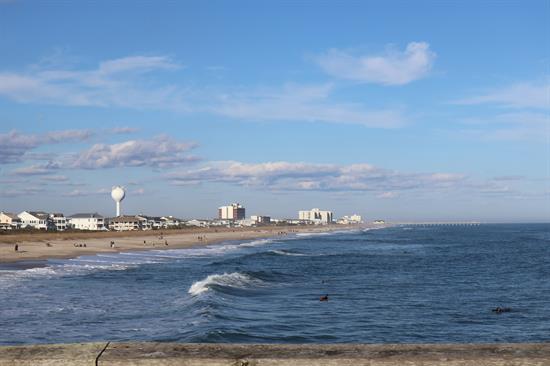Press Releases
Rouzer, Committee Leaders Announce Mark Up of Bipartisan Water Resources Development Act
Washington,
June 24, 2024
WASHINGTON, DC - Today, Water Resources and Environment Subcommittee Chairman David Rouzer (R-NC-07) joined Transportation and Infrastructure Committee leaders in announcing a Committee markup of the Water Resources Development Act of 2024 (WRDA), legislation they will introduce when the House of Representatives is next in session on Tuesday. As Chairman of the Subcommittee, Rouzer played a key role in drafting this legislation and securing priorities specific to Southeastern North Carolina such as flood resiliency and beach renourishment projects. The markup of the full Committee on Transportation and Infrastructure is scheduled for 10:00 a.m. (ET) on Wednesday, June 26, 2024, in 2167 Rayburn House Office Building. This legislation provides authority for the U.S. Army Corps of Engineers (Corps) to carry out critical water resources development projects and studies. Regular consideration of locally-driven, rigorously-studied, and nationally-significant water resources infrastructure is key to preserving our nation’s economy, strengthening U.S. and international commerce, protecting our communities and businesses during natural disasters, and maintaining our quality of life. “The Water Resources Development Act is very important legislation necessary to ensure that the country’s water resources needs are addressed on a consistent bi-partisan basis," said Chairman Rouzer. "Whether urban or rural, inland or coastal, this bill is critical to ensuring solutions to these challenges are achieved in our communities nationwide. Of particular importance to my constituents in North Carolina’s Seventh Congressional District are the coastal restoration and nourishment projects, which mitigate damage from frequent coastal storms, as well as the projects addressing inland and coastal flooding to help protect property and families from flood risk. Since 2014, Congress has enacted a WRDA bill every two years with strong bipartisan support. As chairman of the Subcommittee on Water Resources & Environment, I’m honored to have helped lead the effort in crafting a very good bill that keeps with our institutional bi-partisan tradition." “Congress’ regular passage of WRDA legislation provides economic benefits throughout the United States, and this bill includes provisions to deliver infrastructure projects faster, strengthen our supply chain, and increase accountability at the Corps,”said Chairman Graves. “This important bill will make our ports more competitive globally, allow our inland waterways to more efficiently move products and commodities to markets, and better protect our communities from flooding – something that’s particularly important for the people of North Missouri, where we’re bordered by the mighty Mississippi River and the muddy Missouri River. Thankfully, this bill takes a big step forward in advancing flood control and navigation on both of these rivers, which are a lifeline for our communities and the country. I want to thank Representatives Larsen, Rouzer, and Napolitano for working with me to gather over 1,900 requests from Members of Congress and the stakeholder community, and developing this bipartisan legislation to deliver water resources improvements throughout the nation." “The sixth consecutive bipartisan Water Resources Development Act (WRDA) will invest in ports, harbors, and inland waterways across the country to create and sustain jobs and boost the U.S. economy,” Ranking Member Larsen said. “It will build on a decade of consistent work to strengthen flood control, wastewater, and stormwater infrastructure, keeping people healthy and communities protected. Critically, WRDA 2024 will help communities increase resiliency amid emerging challenges including prolonged droughts and more severe storms. The bill also bolsters early engagement with disadvantaged, rural, and Tribal communities, ensuring access to the Corps’ expertise for often-overlooked communities. I thank Chairman Sam Graves, Subcommittee Ranking Member Napolitano, and Subcommittee Chairman Rouzer for their leadership advancing this legislation to make our infrastructure cleaner, greener, and more resilient." “I am so grateful to have spent the past 10 years working with leaders such as Chairman Graves, Ranking Member Larsen, and Chairman Rouzer to draft bipartisan WRDA legislation,” said Ranking Member Napolitano. “We thank the many Members who brought important ideas to our Committee that provided the foundation for this instrumental water infrastructure bill. WRDA again sets the policies and creates the programs that provide our nation with flood control, environmental improvements, and maritime transportation. I am particularly pleased that WRDA 2024 will make water supply a primary mission of the U.S. Army Corps of Engineers in order to use existing and new Corps resources more effectively to provide water to local communities." WRDA 2024 authorizes 159 new feasibility studies for locally proposed projects and 12 projects that have been thoroughly reviewed by the Corps and have culminated in a final report to Congress with approval by the Chief of Engineers or the Director of Civil Works WRDA 2024 North Carolina priorities championed by Congressman Rouzer include:
Click here for legislative text and for more information on WRDA. |


